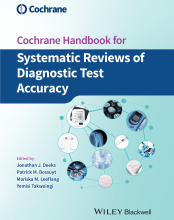
We are delighted to announce the launch of the first complete version and print edition of the Cochrane Handbook for Systematic Reviews of Diagnostic Test Accuracy. After substantive work over the years, this version is now freely available online via the Cochrane Training website and in printed and e-book form, which can be purchased from the Wiley website.
We would not have been able to produce this Handbook without the expertise and commitment of individuals from our Screening and Diagnostic Test Methods Groups and methods community. We would like to thank the team of over one hundred authors, editors and chapter peer reviewers for completing this major piece of work. We especially want to thank the central Handbook editorial team, Senior Scientific Editors, Patrick Bossuyt and Jon Deeks, and the Associate Scientific Editors, Mariska Leeflang and Yemisi Takwoingi.
Overview of the new Cochrane Diagnostic Test Accuracy Handbook
The Cochrane Handbook for Systematic Reviews of Diagnostic Test Accuracy is a guide for those new to conducting systematic reviews of test accuracy and a must-read reference for more experienced authors synthetizing diagnostic evidence. It is applicable to all systematic reviews of test accuracy and is the official guide for Cochrane Reviews of diagnostic test accuracy.
The Handbook contains:
- New guidance on planning a Cochrane Review of diagnostic test accuracy (Chapter 1).
- New guidance on evaluating medical tests (Chapter 2) and the design of test accuracy studies (Chapter 3), as well as updated guidance on understanding test accuracy measures (Chapter 4).
- New guidance on defining the review question (Chapter 5).
- Updated guidance on searching for and selecting studies (Chapter 6).
- New guidance on data extraction (Chapter 7).
- Updated guidance on assessing the risk of bias and applicability in included studies (Chapter 8).
- Updated guidance on understanding meta-analysis (Chapter 9) and new guidance on undertaking meta-analysis (Chapter 10), including detailed code for running analyses in different software.
- Updated guidance on presenting findings (Chapter 11) and drawing conclusions (Chapter 12).
- New guidance on writing a plain language summary (Chapter 13).
How can I find out more?
Below we have compiled a list of the key resources and references that complement the launch of the new Handbook:
- Cochrane released a news post announcing the launch of the Handbook with quotes from Senior Scientific Editors, Professors Jon Deeks and Patrick Bossuyt, and Editor in Chief of the Cochrane Library, Dr Karla Soares-Weiser.
-
A "What´s New" leaflet has been created to highlight key updates in the new Handbook and considerations that authors, peer reviewers and editors may need to take in order to address the methods contained.
The 2023 Cochrane Colloquium will be a key avenue for dissemination of the methods detailed in the Handbook. For those attending, the following will be of particular interest:
- Beyond the intervention question: three new Cochrane Handbooks as the pillars of methodological standards for producing high-quality systematic reviews with different types of evidence on Monday 4 September, from 11:00 to 12:30. This Special Session will provide an overview of the new Cochrane Handbooks, including the Cochrane Diagnostic Test Accuracy Handbook.
- How Cochrane responded to the need for timely, unbiased, informative and accurate evidence on new diagnostic tests during the Covid-19 pandemic on Monday 4 September, from 14:00 to 15:30. This Special Session will introduce the story of the Cochrane COVID-19 Diagnostic Test Accuracy Group – an international group of methodologists, test accuracy specialists, statisticians, epidemiologists and clinicians committed to delivering a portfolio of reviews to provide and maintain a reliable evidence base on which test policies could be based.
Also look out for the core methods training workshops from the Cochrane Screening and Diagnostic Tests Methods Group.
What next?
The authors of this Handbook have aimed to develop guidance based on the best current knowledge. We expect that several of the methods and practices will be advanced even further in the coming years, necessitating an update of this Handbook in the future. The Cochrane Handbook for Systematic Reviews of Diagnostic Test Accuracy will be updated regularly to reflect advances in systematic review methodology and in response to feedback from users.
To facilitate the dissemination of the Handbook, we have developed an implementation plan, so watch this space for further communications and training opportunities.
If anyone has any questions related to this Cochrane Diagnostic Test Accuracy Handbook, please contact support@cochrane.org.

